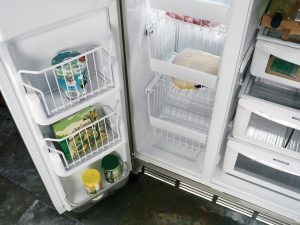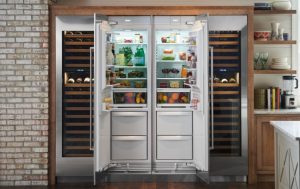Easy Ways to Increase the Lifespan of Your Fridge

The fridge is likely to be the most important appliance in any home. The fridge acts as a hub in any kitchen; it is used every day for preparing meals, getting snacks or enjoying a refreshing drink. So, if you’ve invested in a new fridge, it is essential to think about how you can increase its lifespan. Fortunately, we have some easy ways you can ensure that your new fridge lasts as long as possible.
Clean Your Coils
Your refrigerator cooling coils can be found underneath or behind the unit. Either of these places is likely to collect a great deal of dirt, dust and pet dander. When the coils get buried beneath a layer of gunk, they are unable to keep your fridge functioning. If this is not addressed, your coils may burn out. So, it is a good idea to vacuum your coils every few months and remove any debris to reduce extra strain on your appliance that can compromise efficiency and performance.
Clear the Top
Although it may be tempting to see the top of your fridge as an extra shelf to store cereal boxes or other items, this is not a good idea. Refrigerators release excess heat out of the top of the appliance; you’ll find it feels a little warm to the touch. When you have items on the top of your fridge, it will trap heat and this forces the motor to work harder. Over time, this can cause serious damage, and your fridge is likely to struggle to maintain optimal temperatures, putting your food at risk.
Fill it Up
One of the best kept secrets of refrigeration is that these appliances work better if they are full. It may sound counter-intuitive, but with less space inside the fridge, there is less air that needs to be cooled. So, don’t be afraid to stock up at the grocery store or make extra to have lots of leftovers ready to whip up a quick dinner.
Maintain Your Seals
The quickest way to find yourself with a refrigerator of spoiled food is a bad seal that’s been left for too long. The seal along the inner edge of your fridge door keeps the cold air in while preventing the warm air from getting inside. A gap or leak in your seal can not only force your fridge to work harder to maintain temperature, but it can also drop the temperature to allow bacteria to thrive on your food. Fortunately, it is fairly simple to check if you have a loose seal. Place a dollar bill halfway into the door and shut it. If the bill slips out easily, you have a bad seal. In some cases, cleaning the seal with soapy water to clear any debris can resolve the issue, but if the seal is damaged, you’ll need a replacement.
Establish a Defrost Routine
The best thing to do to ensure your fridge works at its best is regular maintenance. Periodically, clean any loose debris, wipe down the shelves and defrost the freezer. Many modern fridge units are good at preventing condensation or frost build-up, but if you put things into the fridge or freezer when warm or if you store liquids uncovered, it can introduce moisture. To keep your fridge running smoothly and reduce excess strain on the motor, defrost your freezer a couple of times a year and give the fridge a clean every month.
If your refrigerator is reaching the end of its life and you’re considering an upgrade, you can examine your options with this online refrigerator collection or speak to a home appliance specialist for expert advice and guidance.
- How to Design a Year-Round Outdoor Kitchen in Southern California
- What Are Flush-Mount Appliances: Flush-Mount Appliances Explained
- What Appliance Brands Hold Their Value the Longest
- Designing the Ultimate Outdoor Bar: Must-Have Appliances for Year-Round Fun
- Luxury Refrigerator Guide 2025: Built-In vs. Freestanding and What to Know Before You Buy
- How Smart Appliances Are Changing Luxury Kitchen Design in 2025
- The Ultimate Outdoor Grill Guide for 2025: Built-In vs. Freestanding
- Smart Bathroom Faucets & Fixtures in 2025: Blending Technology with Luxury Design
- Built-In Coffee Machines: Are They Worth It for Your Kitchen in 2025?
- How to Choose the Right Dishwasher for Your Home: Noise, Capacity, and Features Explained






